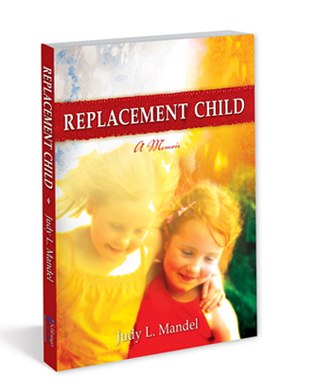I was instantly attracted to Judy Mandel’s memoir, Replacement Child. Mandel’s sister, Donna, whom she never knew, was killed when a plane crashed into her family’s home. Mandel was envisioned as Donna’s replacement. Here’s more description:
A plane crash — the impossible choice a mother must make — the death of
a child — leave a hole in the family that threatens to tear it apart. In a great act of hope, the parents give birth to a “replacement child,” born to heal wounds and provide a “salve for the burns.” The child unwittingly plays her role throughout childhood, riding the deep and hidden currents of the family tragedy. Years later, as an adult, she discovers the truth of her family’s life-changing event and the complex layers of her own relationships with her father, mother, and sister.
The description of the book speaks to me because I, too, was a replacement child. My sister Betsy (pictured), born 59 years ago today, was killed about a month before her second birthday when a car driven by my parents’ landlady backed over her, crushing her skull.
I was born 364 days after her death.
Of course, my situation was somewhat different from Mandel’s. Her sister was 7 when she was killed, and thus had a much more fully formed personality than Betsy did at age 23 months. Mandel had a much bigger job as replacement child for her sister. All I really had to do was be born a girl. During three out of my mother’s four pregnancies, my parents hoped for a boy. But they hoped I would be a girl to replace Betsy.
As soon as I learned of my departed sister’s existence, I was far less consumed with replacing her than with longing for her presence in my life as my big sister. I grew up feeling I was meant to have, not be, a big sister. My role — or perhaps the role I tried to fit into — was reflected in the imaginative games my sisters and I played as children (my parents never did get their wished-for boy); my younger sister Robin would always play the mother when we played “house,” while I played the big sister. I used to pray for Betsy to return to life — for just one day — so I could have a big sister. Later as a teenager, I ached for a big sister who could show me the ropes of things like applying to colleges.
The Encyclopedia of Death and Dying cites Replacement Children as a fairly common phenomenon:
When a child is born into a family that has suffered such a loss, there is concern that the new child might be compromised in his or her development. Such a baby is often described as a “replacement child,” a substitute or replacement for the child who died. This baby is thought to be at risk for later psychological difficulties because of an inability to form an identity separate from the dead child.
I’m guessing (not having read her memoir) that this difficulty in forming a separate identity may have been an issue for Mandel, but it was much less so for me because Betsy’s identity was still so unformed.
Research has been conducted on replacement children, such as the work done by Leslie A. Grout and Bronna D. Romanoff that took the form of a
qualitative interview study [that] examines the family stories told by bereaved parents, with particular attention to how parents represent the dead child and subsequent children in the current family structure. We categorized parents’ stories as those which suggested that parents replaced the loss by an emphasis on parenting subsequent children, or maintained a connection to the dead child through storytelling and ritual behavior. The two ways in which parents maintained the connection were to preserve the space in the family that the dead child would have inhabited, or to create an on-going relationship with the dead child for themselves and their subsequent children.
I would suggest that my parents did both. They preserved Betsy’s space with me, but they also created an on-going relationship with the dead child for themselves and their subsequent children; in our nightly prayers before bed, we would always say, “And God bless Betsy up in heaven.”
What “replacement child” stories do you know? Are you a replacement child?

